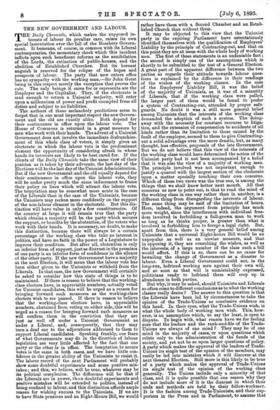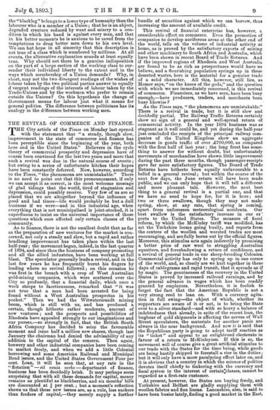THE NEW GOVERNMENT AND LABOUR.
The authors of these melancholy predictions seem to forget that in one most important respect the new Govern- ment and the old are exactly alike. Both depend for their continuance in office upon the labour vote. The House of Commons is returned in a great measure by men who work with their hands. The advent of a Unionist Government does not involve the immediate disfranchise- ment of this whole class of voters, it simply gives an electorate in which the labour vote is the predominant element the opportunity of considering afresh in whose hands its interests are likely to be best cared for. If the clients of the Daily Chronicle take the same view of their position as is taken by their advocate, the last day of the Elections will be the last day of theUnionist Administration. But if the new Government and the old equally depend for their continuance in office upon the labour vote, they will be under pretty much the same inducement to frame their policy on lines which will attract the labour vote. The temptation may be somewhat more acute in the case of the Liberals than in the case of the Unionists, because the Unionists may reckon more confidently on the support of the non-labour element in the electorate. But this dis- tinction will have value in only a few constituencies. Of the country at large it will remain true that the party which obtains a majority will be the party which secures the support, or benefits by the abstention, of the voters who work with their hands. It is necessary, no doubt, to make this distinction, because there will always be a certain percentage of the working class who take no interest in politics, and have no faith in the power of a Legislature to improve their condition. But after all, abstention is only an inferior form of support, just as distrust in the promises of one party is an inferior form of confidence in the silence of the other party. If the new Government have a majority at the next Election, it will mean that the labour vote has been either given to the Unionists or withheld from the Liberals. In that case, the new Government will certainly be asked to consider how this state of things is to be maintained. If there is reason to believe that the working- class electors have, in appreciable numbers, actually voted for Unionist candidates, this will be urged as a reason for bringing forward such measures as the working-class electors wish to see passed. If there is reason to believe that the working-class electors have, in appreciable numbers, abstained from voting on either side, this will be urged as a reason for bringing forward such measures as will confirm them in the conviction that they are just as well off under a Unionist Government as under a Liberal, and, consequently, that they may turn a deaf ear to the adjurations addressed to them to support Liberal candidates. Speaking frankly, our fears of what Governments may do in the direction of labour legislation are very little affected by the fact that one party or the other is in office. The temptation to secure votes is the same in both cases, and we have little con- fidence in the greater ability of the Unionists to resist it. The labour record of the next Parliament will probably show some doubtful experiments and some positive mis- takes ; and this, we believe, will be true, whatever may be its political complexion. The difference will be that if the Liberals are in power, these doubtful experiments and positive mistakes will be extended to politics, instead of being confined to labour, and this distinction affords ample reason for wishing success to the Unionists. If we are to have State pensions and an Eight-Hours Bill, we would rather have them with a Second Chamber and an. Estab- lished Church than without them.
It may be objected to this view that the Unionist party in the expiring Parliament have ostentatiously identified themselves with the qualification of Employers' Liability by the principle of Contracting-out, and that on this point they are at issue with the whole body of working men. The first of these statements is an undeniable fact ; the second is simply one of the assumptions which is shortly to be submitted to the test of a General Election. A great part of the apparent difference between the two parties as regards their attitude towards labour ques- tions is explained by the difference in their readings of the wishes of the working classes. In the case of the Employers' Liability Bill, it was the belief of the majority of Unionists, as it was of a minority of Liberals, that if the working class were polled, the larger part of them would be found to prefer a system of Contracting-out, attended by proper safe- guards. No doubt it was a still more general belief among Unionists that the interests of the working class demanded the adoption of such a system. The doing- away with the necessity for constant recourse to litiga- tion, and the extension of compensation to accidents of all kinds rather than its limitation to those caused by the fault of the employer, seemed to them to give Contracting- out a solid advantage over the more drastic, but, as many thought, less effective, proposals of the late Government. But we do not believe that this view of the interests of the working class would have determined the action of the Unionist party had it not been accompanied by a belief that it was also the view of a majority of working men. The principle involved was not important enough to justify a quarrel with the largest section of the electorate upon a matter specially touching their own concerns. Which of these two views was the true one, is among the things that we shall know better next month. All that concerns us now to point out, is that to read the mind of the working class in one way rather than in another, is a different thing from disregarding the interests of labour. The same thing may be said of the limitation of hours. Here, indeed, the argument from principle has much more weight, since the interference with individual free- dom involved in forbidding a full-grown man to work as long as he thinks proper, is greater than what is involved in forbidding him to forego a legal right. But, apart from this, there is a very general belief among Unionists that a universal Eight-hours Bill would be an unpopular as well as an unwise measure, and that in opposing it, they are consulting the wishes, as well as the interests, of a large number of the class such a bill would affect. If this is so, there can be no cause for bewailing the change of Government as a disaster to labour. Even a Liberal Government could not, in the long-run, befriend working men against their own will, and so soon as that will is unmistakably expressed, politicians ready to befriend them will crop up in abundance in both parties.
But why, it may be asked, should Unionists and Liberals so often come to different conclusions as to what the working classes really desire ? The answer to this question is that the Liberals have been led by circumstances to take the opinion of the Trade-Unions as conclusive evidence on this head. In their eyes, what the Trade-Unions wish, is what the whole body of working men wish. This, how- ever, is an assumption which, to say the least, is open to dispute. To begin with, what reason have we for feeling sure that the leaders and the rank-and-file of the Trade. Unions are always of one mind ? They may be of one mind in the majority of cases, or upon questions which relate only to the administration of the funds of the society, and yet not be so upon larger questions of policy. A party which makes the approval of the leaders of Trade- Unions its single test of the opinion of the members, may easily be led into mistakes which it will discover at the next General Election. Still more is this likely to be true of a party which makes the approval of Trade-Unions its single test of the opinion of the working class generally. The Unions include only a minority of that class, and it is quite possible that one reason why they do not include more of it is the distrust in which their ends and methods are held by their fellow-workmen. It is the fashion among Trade-Unionists, and their sup- porters in the Press and in Parliament, to assume that the "blackleg" belongs to a. lower type of humanity than the labourer who is a member of a Union ; that he is an abject, degraded creature reduced by want and misery to a con- dition in which his hand is against every man, and that in his better moments he is anxious to be saved from the temptations to drag better men down to his own level. We can but hope in all sincerity that this description is not true of a class which is numbered by millions. At all events, the alternative explanation sounds at least equally true. Why should not there be a genuine indisposition on the part of a large section of the working class to sur- render their individual liberty to the extent and in the ways which membership of a Union demands ? Why, in short., may not the two divergent readings of the wishes of labour taken by the two political parties answer to equally d vergent readings of the interests of labour taken by the Trade-Unions and by the workmen who prefer to remain outside the Unions? On this hypothesis the change of Government means for labour just what it means for general politics. The difference between politicians has its analogy in the dfference between working men.









































 Previous page
Previous page